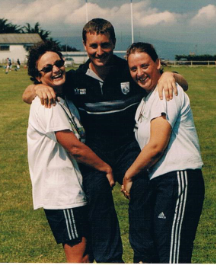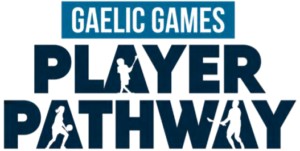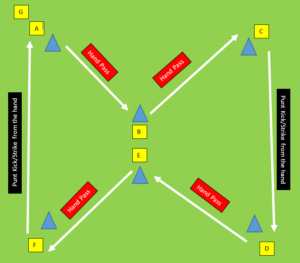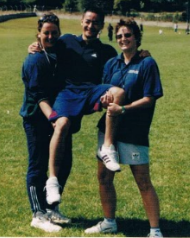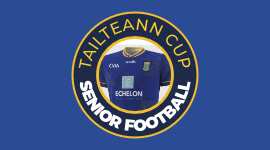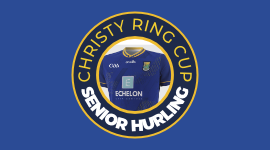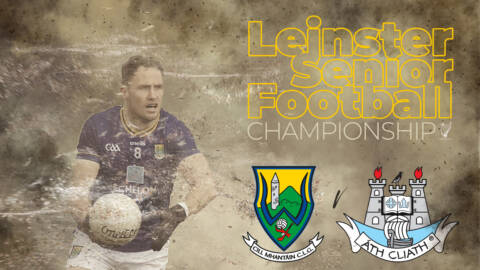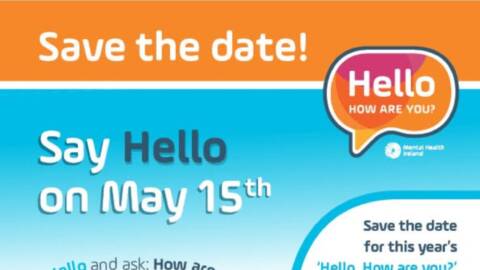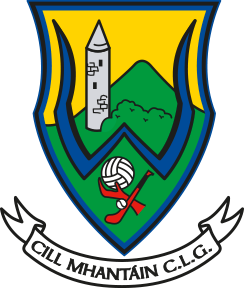Seeing our clubs with their gates open and people playing, and especially young people back out in the open air with their friends will be worth the wait. Roll on the 26th April. In the meantime, all our staff will be back out coaching in Primary schools this week after the Easter Holidays. Schools will fully return, with all students back in the classroom for the first time since December.
The Gaelic Games Player Pathway – 3 Key Player Development Strands
Having a framework built around key strands that align with what is most important to us in player development, we believe enables us to best develop all players in our Pathway. These strands bring the Pathway to life and are very much based on the stated core values of the Gaelic Games family, encompassing The Player, The Environment and The Game. The Gaelic Games Player Pathway recognises that development is a complex interaction between the player, his/her environment and the game. Therefore, it is portrayed here as interlocking, supportive cogs with the player cog dominating both the environment and the game.
THE PLAYER
At the heart of our Pathway is the player, who should be the central focus of any effective player development environment. The player refers to the individual person and the characteristics that are necessary to be developed over time in order for the person to reach their potential both on and off the pitch. We know that the journey from first involvement to reaching one’s full potential is extremely complex, non-linear and individualistic – therefore it cannot be prescriptive. Players need a wide range of skills to succeed and these will be developed over time through a coaching approach that is adaptive to the player, his/her environment and the game. The Gaelic Games Player Pathway has identified 6 interacting and connected attributes that sit at the heart of a player’s Gaelic Games DNA, all vital in ensuring both the player and the person reach their full potential. These attributes are developed from a player’s first involvement at nursery level right through to their last involvement at adult level i.e. from the F1 phase to F3 or E1.
1.Passion
Passion is defined as a strong inclination and desire toward an activity one likes, finds important, and invests time and energy. Research has identified that young people today often cite that their lives are monotonous, boring and unexciting. Having a passion for Gaelic Games can be looked at as a means of countering modern day youth’s discontentment and alienation and developing in young people a focus that may help to increase intrinsic motivation and self-worth. For this to occur, our coaching focus for our players must be loaded towards self-improvement and mastery of tasks rather than performance outcomes e.g. winning/losing. As coaches, we will only support the acquisition of passion when we create environments around our players that are caring, that allow for player input and choice and that provide players with clear feedback when they are attempting desired outcomes.
- Respect
Respect is having a regard for other people and their lives; it is showing those around us compassion and empathy. The sports environment is a great place to grow and establish respect. While involved in Gaelic Games, players will learn the importance of respecting their teammates, coaches, referee, opponents and spectators. Young players look to their coaches as role models and are likely to observe their coaches’ behaviours. It is unlikely that players will be able to control their behaviours, if their coaches are unable to control their own behaviour. Coaches who show respect to their players, officials and opponents before, during, and after games can truly expect their players to do the same.
- Responsibility
When children and youth become engaged in Gaelic Games, it is believed that they will benefit from their experience. Parents, coaches, and administrators often assume that in addition to physical fitness, children and youth will acquire important life skills just by being there. However, research indicates that mere sport participation alone does not guarantee life skill development. It seems that it is necessary to teach young people both how to lead and how to develop responsibility. This implies that Gaelic Games players require experiential learning, where supervising adults allow them to make “meaningful” decisions and to become active agents in their own development. Research emphasizes that the coach has the critical role in conducting developmentally appropriate programs that focus on the enhancement of these strengths and personal resources. It is through the development of such skills, values and virtues, our youth will experience a successful transition These 6 key attributes are: to adulthood.
- Commitment
When a child is in the right sports environment, it can yield positive social, physical, emotional and psychological outcomes. Every child who plays Gaelic Games should have the opportunity to consistently experience these types of outcomes. Therefore, the framework aims to support and sustain player involvement in our games so that youths enjoy such opportunities, Sport commitment is the extent a person wishes to continue participating in his or her sport. Undoubtedly, fun and enjoyment derived from playing Gaelic Games are of crucial importance in terms of developing one’s commitment. However, it has been discovered that the motivational climate (mastery v ego orientated climates) and autonomy-supportive behaviours of the coach are even more important in terms of sustaining involvement. Such environments therefore, afford our players a prolonged opportunity for positive youth development.
- Resilience
Resilience is a vital psychological attribute which we all require to overcome the various obstacles we encounter in life. Involvement in Gaelic Games provides many opportunities for both parents and coaches to catch opportunities that can be used to develop resilience in young people. We cannot protect players from trauma and disappointments but we must work on developing within them, the tools necessary to deal effectively with the emotions that these events are associated with. Our coaches must possess a philosophy that aspires to support our player’s personal development as well as their athletic development. Through the player/coach relationship, a level of connectivity must be present so that the player feels that the coach is a support to them, most especially when they experience confidence issues or have difficulty coping when things are difficult.
- Creativity
Research has shown that as sport has become more professionalised and coaching becomes more prescriptive, players over time have become less creative. In the past, creativity had its genesis on streets and fields as children imagined themselves to be their heroes when playing against siblings and neighbours in daily games. These learning grounds have been replaced by structured coaching in clubs and schools where the coach prescribes how children develop skills. If we want our players to be innovative, creative and have the ability to problem solve, then we must find a balance between exposing children to organised structured coaching sessions and unstructured ‘free play’. Gradually, these free play activities can give way to more deliberate practice activities such as scenario or games based sessions which focus on solving tactical problems. However, in order to sustain motivation, it is vital that players feel part of the solution process and outcomes are focused on self-improvement, both individually and as a collective
Club Transfer Window Extended
The CCC has received communication from Croke Park that due to the exceptional circumstances surrounding the COVID19 crisis in 2021 they are recommending that the Club Transfer window be extended or reopened for a set period of time.
With this in mind the CCC has made the decision to reopen the Transfer window in Wicklow until 6.00pm on Wednesday 21st April. Any transfers that were rejected by the CCC this year on the basis that they had been submitted late or after the original application date will automatically be entered by the CCC for consideration, you do not need to resubmit these transfer applications. All transfers must be submitted to secretary.wicklow@gaa.ie and fixtures.wicklow@gaa.ie
Drill of the Month – Hand Pass followed by a Punt Kick/Strike from the Hand
Description – activity caters for 7 players (one player at cones B, C, D, E & F and two Players at A (A/G)
- A Hand Passes to B
- B Hand Passes to C
- C Punt Kicks/Strikes to D
- D Hand Passes to E
- E Hand Passes to F
- F Punt Kicks/Strikes to G
Players run to the group they are Hand Passing or Punt Kicking/Striking to.
The aim of this drill is quickly switch play. This is vital to open up space to run into. This activity practices creating space by hand passing to players in the middle who then the gives a wide hand pass to another player followed by a direct punt kick/striking from the hand. Distance between cones can increase and decrease depending on ability of players, but you can start with a 15m Square and expand from there.
Modifications
- Use both left and right sides when practicing
- Use additional footballs/Sliotars to increase the speed, intensity and concentration
- Footballs/Sliotars can go in opposite directions
- Put a time limit on it to increase competition against each other
- What other variation/modification can you include by using other skills?
Referees Return to Play
All current referees should be in the process or completed their online in service for the GAA return to play that involves completion of the following guidelines.
1 Referee in service on line
2 Confirm club membership
3 Confirm Garda Vetting Is current
4 Confirm child safeguarding course is completed on line
5 Confirm that Covid online training module is completed online
Should you compete like you train or train like you compete?
Let me introduce you to my two essential opinions for sports success that makes it an absolute requirement for you to train like you compete so you can compete like you train.
First opinion whatever you do in competitions, you must first do in training. This too seems obvious, yet is often neglected by players. Have you ever tried something new on the day of a competition that you’ve never done in training? Hopefully not, but if you had, it probably didn’t work very well for you because if you haven’t practiced it in training, there’s no way that it will work in a competition. If you want to perform technically and tactically well in competitions, you better get that technique and those tactics down in training first. The same holds true for every other aspect of your competitive preparations, whether physical or mental readiness.
Second opinion, whatever you do in training is what you will do in a competition. Ideally, the purpose of training is to develop effective skills and habits that will translate into great performances in competitions. But here’s the problem: players often practice bad skills and habits in training. For example, if you practice bad technique in training (not intentionally, of course), that’s what you become good at (you get good at being bad!) and that’s what comes out in the competition. Whether you practice good or bad skills and habits doesn’t just apply to technique and tactics. It has a huge impact on your mental preparation as well.
My answer is a resounding “YES!” You should train like you compete so you can compete like you train. The more you can make training like a competition, the more you will ingrain in your mind and body the skills and habits to perform your best in competition. The ultimate goal of which is that when you get to a competition, your mind and body automatically do what you do in training and you will perform at your highest level in the competition just like you do in training.
Quote of the week:
“I’d say handling people is the most important thing you can do as a coach. I’ve found every time I’ve gotten into trouble with a player, it’s because I wasn’t talking to him enough.”
– Lou Holtz, American Football
Three Weekly Coaching Tips:
- Delegate, delegate, delegate – give players, assistants, parents and officials responsibility for aspects of your (their) coaching programme.
- Enthusiasm, encouragement, energy = excellence
- Look for things to improve in yourself.
You can contact us:
We are here to help get in touch with Coaching Corner by contacting us at hugh.kenny.gamesmanager.wicklow@gaa.ie if you would like any topic or area covered in more detail in our weekly edition
15 Player Profile Questions
Name: Oisin Dignum
Club: Rathnew
School: Gael Colaiste
Age: 12
- My Favourite GAA Player? David Clifford
- My Favourite GAA Grounds? Croke Park
- My Favourite Playing Position? Centre Forward / Midfield
- My Favourite Food? Chicken Wings
- My Favourite Music? Rap
- My Favourite TV Film or Programme? Grown Ups 1/2
- What I think is the most important Skill in the game? Being able to solo & kick with both feet
- What is your favourite GAA Drill/Activity? Backs 7 Forwards
- In 10 years’ time I hope to be? Playing Senior Football for Wicklow
- My favourite team in any Sport? Manchester United
- If I won, the Lotto I would? Go on a Family Holiday
- Do you play any other Sports? Yes, Soccer
- What are your hobbies? Cycling
- My Pet Hates are? Clutter
- My favourite PlayStation Game is? Fifa/ Call of duty
By wicklowpro Thu 15th Apr
